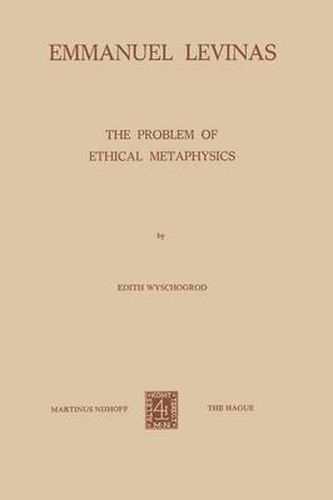Readings Newsletter
Become a Readings Member to make your shopping experience even easier.
Sign in or sign up for free!
You’re not far away from qualifying for FREE standard shipping within Australia
You’ve qualified for FREE standard shipping within Australia
The cart is loading…






This title is printed to order. This book may have been self-published. If so, we cannot guarantee the quality of the content. In the main most books will have gone through the editing process however some may not. We therefore suggest that you be aware of this before ordering this book. If in doubt check either the author or publisher’s details as we are unable to accept any returns unless they are faulty. Please contact us if you have any questions.
Emmanuel Levinas recounts the main events of his life in a brief essay, Signature, appended to a collection of essays on social, political and religious themes entitled Dillicile Uberti. He was born in I905 in Lithu ania and in I9I7, while living in the Ukraine, experienced the collapse of the old regime in Russia. In I923 he came to the University of Strasbourg where Charles Blondel, Halbwachs, Pradines, Carteron and later Gueroult were teaching. He was deeply influenced by those of his teachers who had been adolescents during the time of the Dreyfus affair and for whom this issue assumed critical importance. Continuing his studies at Freiburg from I928-I929, he served an apprenticeship in phenomenology with Jean Hering. Subsequent encounters with Leon Brunschwicg and regular conversations with Gabriel Marcel served to distinguish, to sharpen and bring into the foreground, his own unique point of view. He also attests a long friendship with Jean Wahl. To gether with Henri Nerson he undertook a study of Talmudic sources under the guidance of a teacher who communicated the traditional Jewish mode of exegesis. It is no accident that Levinas begins his autobiographical account, which is indeed no more than a spare outline of events and formative influences, with the information that the Hebrew Bible directed his thinking from the time of his earliest child hood in Lithuania.
$9.00 standard shipping within Australia
FREE standard shipping within Australia for orders over $100.00
Express & International shipping calculated at checkout
This title is printed to order. This book may have been self-published. If so, we cannot guarantee the quality of the content. In the main most books will have gone through the editing process however some may not. We therefore suggest that you be aware of this before ordering this book. If in doubt check either the author or publisher’s details as we are unable to accept any returns unless they are faulty. Please contact us if you have any questions.
Emmanuel Levinas recounts the main events of his life in a brief essay, Signature, appended to a collection of essays on social, political and religious themes entitled Dillicile Uberti. He was born in I905 in Lithu ania and in I9I7, while living in the Ukraine, experienced the collapse of the old regime in Russia. In I923 he came to the University of Strasbourg where Charles Blondel, Halbwachs, Pradines, Carteron and later Gueroult were teaching. He was deeply influenced by those of his teachers who had been adolescents during the time of the Dreyfus affair and for whom this issue assumed critical importance. Continuing his studies at Freiburg from I928-I929, he served an apprenticeship in phenomenology with Jean Hering. Subsequent encounters with Leon Brunschwicg and regular conversations with Gabriel Marcel served to distinguish, to sharpen and bring into the foreground, his own unique point of view. He also attests a long friendship with Jean Wahl. To gether with Henri Nerson he undertook a study of Talmudic sources under the guidance of a teacher who communicated the traditional Jewish mode of exegesis. It is no accident that Levinas begins his autobiographical account, which is indeed no more than a spare outline of events and formative influences, with the information that the Hebrew Bible directed his thinking from the time of his earliest child hood in Lithuania.